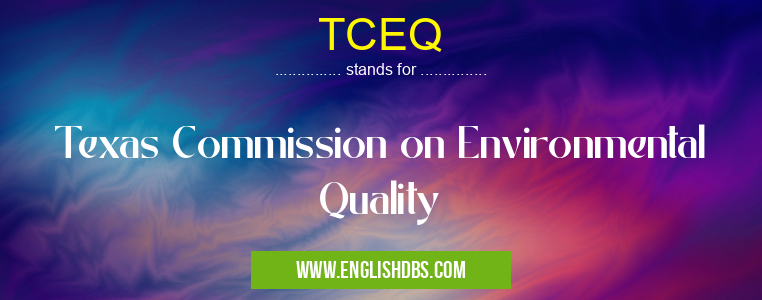What does TCEQ mean in ENVIRONMENTAL
TCEQ is an acronym that stands for Texas Commission on Environmental Quality. It is a public agency created by the state of Texas to protect and improve the state’s environment and natural resources. The commission is responsible for ensuring that all Texans have clean air, water, and land to live, work, and play in. The agency also regulates air pollution, waste disposal, and water quality throughout the state. By setting standards for environmental protection and implementing programs to monitor compliance with those standards, TCEQ helps ensure public health and safety while also promoting economic growth.

TCEQ meaning in Environmental in Governmental
TCEQ mostly used in an acronym Environmental in Category Governmental that means Texas Commission on Environmental Quality
Shorthand: TCEQ,
Full Form: Texas Commission on Environmental Quality
For more information of "Texas Commission on Environmental Quality", see the section below.
What Is TCEQ?
The Texas Commission on Environmental Quality was established by the state legislature in 1975. This government agency operates under the provisions of the Texas Water Code as a regulatory body in charge of protecting the air, land, and water resources of the Lone Star State from any form of contamination or harm caused by emissions of pollutants or contaminants. The agency sets standards for acceptable levels of pollutants in various air quality areas. It also develops plans for reducing or controlling emissions into rivers or streams that can affect drinking water supplies or cause damage to aquatic life forms such as fish or plant life. Within its jurisdiction are all matters relating to solid wastes management including hazardous wastes generated within the state as well as those imported from other states or countries. In addition, TCEQ’s responsibilities include developing extensive regulations covering agriculture runoff; providing assistance to local governments when implementing best management practices; monitoring sites where oil & gas activities are being conducted; granting permits to water utilities so they can use surface water sources; overseeing brownfield redevelopment projects; investigating complaints related to environmental issues; educating citizens about proper waste management practices; enforcing state laws pertaining to environmental protection measures; managing underground storage tanks used in both commercial & industrial operations; regulating factories & businesses who produce a variety of goods that make regular use of chemicals & toxic substances during the production process
Essential Questions and Answers on Texas Commission on Environmental Quality in "GOVERNMENTAL»ENVIRONMENTAL"
What does the Texas Commission on Environmental Quality do?
The Texas Commission on Environmental Quality is a state agency tasked with protecting and preserving the environment by ensuring that clean air, clean water, and safe management of waste are achieved in Texas. The agency also works to provide technical assistance and financial help to local governments, businesses, as well as citizens in order to ensure environmental protection.
How can I contact TCEQ?
You can contact the TCEQ either by calling their main phone number at 512-239-1000 or go online to their website at www.tceq.texas.gov where you can use the ‘contact us’ form found at the bottom of the page.
Does TCEQ have any resources available for those looking to learn more about environmental issues?
Yes! The TCEQ has a variety of educational resources available for those looking to become more informed about environmental topics such as air quality, water quality, waste management and much more. To access these resources you can visit their website at www.tceq.texas.gov and select the ‘Education & Outreach’ tab located at the top of the page.
How does TCEQ monitor air pollution?
The TCEQ monitors air pollution through an extensive network of ground level air quality monitors spread across Texas that measure ozone, particulate matter and other pollutants in our atmosphere 24 hours a day seven days a week. This data is then used to assess levels of air quality throughout Texas and information is made available to citizens via their website at www.tceq.texas.gov/airquality/.
How does TCEQ enforce environmental regulations?
The TCEQ enforces environmental regulations through both administrative orders (i.e., warning letters) as well as civil enforcement actions (such as fines). Administratively they may require corrective action or closure/ compliance plan from those who violate regulations while civil enforcement actions take legal action against those found guilty of violations or who fail to comply with corrective action plans within specified timelines.
Are there any grants available through TCEQ?
Yes, there are many grant opportunities through the Texas Commission on Environmental Quality which are offered throughout the year including grants targeted towards funding research projects related to improving water or air quality in Texas communities or providing small public water systems with additional funds for upgrading facilities. For more information on current grants visit www.tceq.texas.gov/financial/grants/.
What kind of fines may be imposed by TCEQ if someone violates environmental laws?
Depending on severity of violation fines up to $25000 per day per violation may be imposed by the agency although most violations result in lower penalties such as warnings or orders outlining specific corrective actions required by violators within particular time frames.
Is there an appeals process if someone believes they have been unfairly punished by a decision made by TCEQ?
Yes! If you disagree with an enforcement penalty issued by the commission you may appeal this decision within 30 days of receiving notification from them in writing using the ‘Notice of Intent’ form found on their website under Administrative Hearings section located here https://www2tceq/sitecollectiondocuments/forms/notice_of_intent_formpdf
Final Words:
TCEQ works hard every day to help ensure that all Texans have access to clean air, land, and water resources. From setting standards for environmental protection to developing plans for reducing emissions into rivers or streams – this public agency carries out its mission with an unwavering commitment towards protecting our natural resources from harm caused by pollutants or contaminants released into our environment. We owe it to ourselves –and future generations -to ensure these vital resources remain safe and healthy so we may continue enjoying them now and long into the future.
